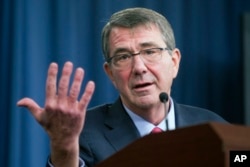The Pentagon issued an invitation Wednesday to hackers -- provided they're U.S. citizens and can pass a background check -- to attack its websites as a test of its cybersecurity.
The pilot project is considered the first of its kind by the federal government.
"I am confident this innovative initiative will strengthen our digital defenses and ultimately enhance our national security," Defense Secretary Ash Carter said in a statement unveiling the pilot program.
"Hack the Pentagon" is set to begin next month and could involve monetary awards to participants who can spot weaknesses on the Pentagon's public websites. More sensitive networks or key weapons programs would not be included, the statement said.
"Once vetted, these hackers will participate in a controlled, limited duration program that will allow them to identify vulnerabilities on a predetermined department system," the Pentagon said.
'Bug bounty'
So-called "bug bounties" are conducted by large U.S. companies that allow cyber experts to find and identify problems in their networks before malicious hackers can exploit them.
A senior defense official told reporters at a Pentagon briefing Wednesday that these outside experts will "use their skill sets and expertise... to make the country more secure."
Program details and rules were still being worked out, but one official said thousands of qualified participants are expected to join the initiative.
"I am always challenging our people to think outside the five-sided box that is the Pentagon," Carter said in Wednesday's statement.
During a trip to California's "Silicon Valley" on Tuesday, Carter stressed national security in urging greater cooperation between the public sector and private industry regarding data security and encryption.
Carter had traveled to the area, where many of the world's largest high-tech companies are located, to discuss cybersecurity. He warned officials that failing to improve U.S. defenses would allow China, Russia and others that do not favor a free Internet to set new global standards.
Encryption case
Carter did not directly address the controversy between the U.S. government and Apple, in which the FBI is asking the company to help it access information on an iPhone linked to the shooters in the San Bernardino, California, terror attack late last year.
He said, however, that the Pentagon, as the world's largest user of encryption, viewed such technology as critical. He also said no one case should drive future policy considerations.
"We shouldn't let the solutions to this larger issue of how to handle data security as a society be driven by any one particular case," Carter said after a speech to the Commonwealth Club of San Francisco, according to Reuters. "It would be unreasonable."
Carla Babb at the Pentagon contributed to this report.






